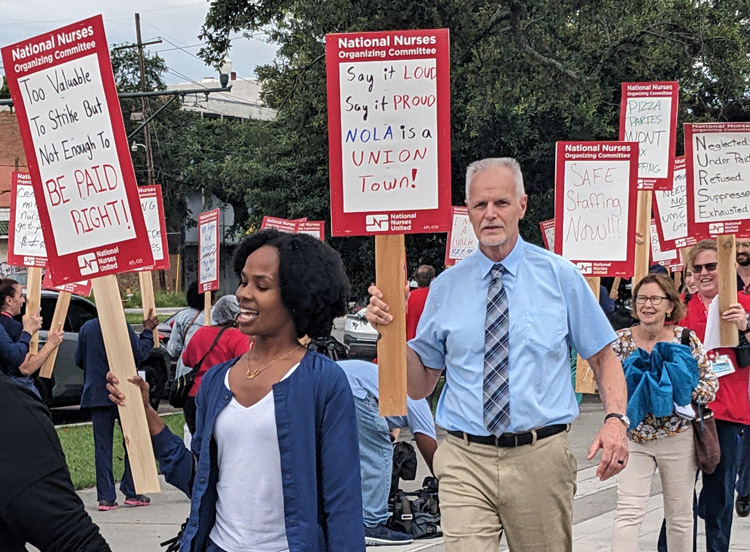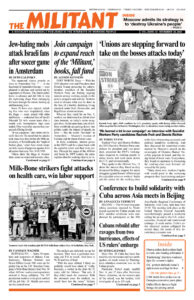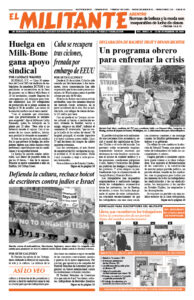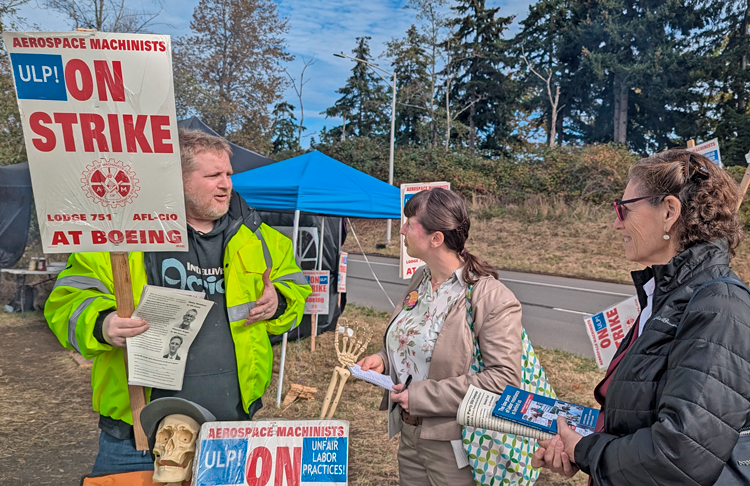‘We learned a lot in our campaign’: an interview with Socialist Workers Party candidates Rachele Fruit and Dennis Richter
Rachele Fruit and Dennis Richter, the 2024 Socialist Workers Party candidates for president and vice president, presented the SWP’s working-class program to working people in cities, towns and rural areas across the U.S. and internationally.
They spoke to the Militant Nov. 11 about the interest they found as they discussed building support for union struggles against bosses’ efforts to put the capitalist crisis on workers’ backs and the stakes for the working class in the face of mounting economic and political instability worldwide. And they discussed the watershed events marked by Moscow’s assault on the sovereignty of Ukraine, Hamas’ Nazi-like pogrom in Israel, and the rising threat of more wars. Everywhere, they found an openness to discussing the working-class road forward advanced by the party.
“Many times over, workers I spoke with would point to the worsening prospects they faced starting and providing for families,” Fruit said. In her home state of Florida, “nearly 30% of parents are either quitting their jobs or taking reduced hours to look after their children because they can’t afford child care.”
The social, economic and moral crisis coming down on workers will not go away with a new president, she said.
During the campaign, Fruit and Richter walked picket lines of striking Machinists at Boeing, longshore workers at Gulf and East Coast ports, nurses, postal workers fighting for a better contract, and with other unionists. They used their campaign to win support for these fights.

Every union struggle is watched closely by fellow workers, Fruit pointed out. Two-tier contracts have been forced on unions for decades, but when United Auto Workers members threatened to strike earlier this year at Daimler Truck in North Carolina, they forced bosses to back down “and end the two-tier wage setup, something that was noticed by tens of thousands of other workers,” she said.
“Nurses in Pittsburgh fought and won a new contract that included more hiring,” Fruit said, pointing to comments by one striker who said that improving health care required extending their fight to hospitals across the region, including where nurses didn’t yet have a union.
“When workers make gains somewhere,” Richter said, “that’s seen as good for the rest of us. More workers are looking to solve our problems together as a class, not as individuals.
“They were interested when we explained our program is built on the experiences of past workers’ struggles and revolutionary advances, not some ‘good ideas.’”
“Workers know we’re exploited by the bosses,” Fruit said. “What we bring to these discussions is the recognition that society can be organized differently. That’s possible if we overturn the rule of the capitalist class and replace it with a government of our own.
“Millions see that the Democrats and Republicans are not the answer to what we face,” she said. “We got a tremendous response when we explained workers need a party of labor, a political vehicle to fight for the things that our class needs.”
“Trump claims he’s going to end inflation and stop the wars unfolding today,” Richter pointed out. “But many workers are skeptical.” At the same time, “many readily agreed when we said that workers are a class with our own interests, that we’re the great majority, produce all the wealth and need to organize together to defend ourselves.”
In the course of union struggles, workers “seek ways to overcome divisions that the bosses use to weaken us,” Fruit said. She pointed to a fight in July by truck drivers in Mexico and the U.S. who joined together to try to improve their working conditions.
Fruit visited Charleroi, Pennsylvania, in October where immigrant Haitian workers had been slandered, she said. “At a factory plant gate I met workers who disagreed with looking at immigrants that way. One native-born worker told me, ‘Immigrants are human beings just like us.’”
Both parties look to regulate immigration up and down, as the bosses’ need for cheap labor requires. President Joseph Biden issued an executive order in June to speed up deportations. President-elect Donald Trump is threatening mass deportations. Throughout their campaign, Fruit and Richter explained that fighting for an amnesty for undocumented workers in the U.S. is key to forging working-class unity and building a stronger labor movement.
Fighting Jew-hatred
“We began the campaign with the need to respond to Hamas’ Oct. 7 pogrom,” Fruit said, a turning point in world politics. “We utilized the continuity of the communist movement, going back to the fight waged by Lenin and the Bolsheviks during the Russian Revolution against all expressions of Jew-hatred.
“Mostly workers are repelled by what Hamas did and agreed when we said Israel must be defended as a refuge for Jews. Some asked, ‘Why does there have to be so many Palestinian deaths?’ I explain that this was the responsibility of Hamas, which purposely puts their weapons caches, missiles, tunnels and bases in schools, hospitals and under workers’ homes.”
“When workers see Israeli forces acting to defend Jews from Hamas’ death squads, they identify with this fight,” said Richter. “Many ask, ‘Why are they doing this to Jews?’
“Without understanding how Jew-hatred rises in the imperialist epoch amid the decline of world capitalism, the Jewish question remains a big mystery,” he said. “Without seeing what every working-class movement will eventually face from fascist forces — which organize under the banner of Jew-hatred — it cannot be understood.
“It’s in the working class that we find real interest in learning more about this. If you don’t start from within the working class, you’d think more and more people are turning against Jews,” Richter said. “We find just the opposite — it’s there that you will find workers who will come to the defense of Jews.”
A working-class foreign policy
A working-class foreign policy is needed, Fruit said, “because the U.S. rulers do nothing in the Middle East, or anywhere else in the world that’s not based on their own class interests.”
“Two Iraq wars and the war in Afghanistan were not ‘mistakes,’ by the U.S. rulers,” Richter added. “They will use their massive military forces again, with deadly consequences for workers. What can stop that is the working class taking power into our own hands.”
“The biggest question we were asked was, ‘Is it possible for workers to do this?’” Fruit said. “It is, as confidence and class consciousness grows.”
During her visit to the U.K., she met rail workers in Manchester who fought successfully for union recognition. “One of them asked, ‘How do you get workers who are involved in a fight for better wages to learn about broader political questions?’ I said that begins to happen when workers struggle together and start to see what we’re up against — the bosses, their parties and their government — and to see what workers are capable of doing.
“We point to Cuba’s socialist revolution, its leadership and what working people there accomplished and have defended ever since,” she said. “It shows what’s possible.
“And we point to the working-class solidarity that comes to the fore when there’s a social catastrophe, like after the recent hurricane in North Carolina, or the deadly flooding in Spain.” In the absence of aid from capitalist governments, “workers step forward to do what’s needed. Examples like this show the ability of the working class to run society. But to unleash that potential, workers need to take political power,” Fruit said.
“Along the way, working people will need to defend constitutional freedoms from attack by both Democrats and Republicans,” said Richter. “No matter who is in the White House, they’ll use the capitalist ‘justice’ system — the cops, the FBI and the courts against workers and the working-class vanguard.”
“Today Democrats are reacting hysterically to their election defeat,” Fruit said. “They blame working people who couldn’t bring themselves to vote for Kamala Harris.”
In sharp contrast “the SWP is looking forward,” she said. “Workers face a good situation, more of us are confident we can use our unions to defend ourselves. And to workers who backed the SWP campaign, we say, ‘Our party is your party.’ Learn more about the SWP and its program, and join us in the class struggles that lie ahead.”


